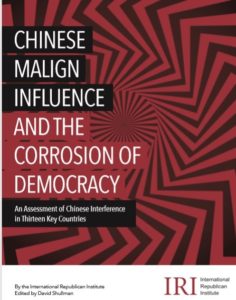Neither China nor America seeks war, surely. But they are deliberately hurtling toward economic separationhttps://t.co/IQY975OSuw
— The Economist (@TheEconomist) May 8, 2020
You might have hoped that a pandemic would bring the world together. Instead covid-19 is tearing it apart. As the disease has spread, relations between America and China have plunged into an abyss from which they will struggle to escape, The Economist writes:
Reuters news agency this week reported on an internal paper prepared for China’s leaders, warning that feelings around the world against their country, led by America, are more intense than at any time since the killings around Tiananmen Square in 1989. China will slap down foreign critics more vigorously than ever.
Can democracies prevail yet again in a second global battle against the totalitarian impulse? That’s the question Andrew A. Michta poses in a must-read article outlining The Building Blocks of a China Strategy.
To prevail, we must recognize that we are facing not “China” as a civilization, but rather a communist power whose ideology has always been at its core totalitarian. What is unfolding before our eyes—and has been underway for three decades since the end of the Cold War—is the second, and possibly decisive and final stage of conflict between liberal democracy and communism, he writes for the American Interest:
Unfortunately, over the years we have taught ourselves not to be able to see such things. …. Containment was well-suited to American society in 1947, for we enjoyed unprecedented social cohesion and trust in democracy. In short, a wealthy and self-confident America confronting a war-ravaged Soviet state could afford to engage in what was essentially a defensive strategic concept, with the stipulation that time would be (and indeed was) on our side… As we search for a strategy to stop the global expansion of China’s brand of commercial communism, we must recognize that we are in an existential struggle against an enemy we have largely created through our own venality.

National Endowment for Democracy (NED)
At its most fundamental level, our new China strategy must be about returning American democratic capitalism to its roots—about restoring a sense of commonality, patriotism, and civic responsibility to our business, politics, and culture, adds Michta, the dean of the College of International and Security Studies at the George C. Marshall European Center for Security Studies. With it, we must abandon optimistic globalist cant about convergence and start to see communist China not as a future member of the liberal international order but as its destructor. RTWT
The COVID-19 pandemic is a perfect opportunity for Beijing to advertise its authoritarian system as a superior model over Western-style democracy to manage such a global crisis, note Sarah Jacobs Gamberini and Amanda Moodie, Policy Fellows at the National Defense University’s Center for the Study of Weapons of Mass Destruction.
 So what is a democracy to do? There are several steps the United States might take to counter China’s influence, they write for Instick Media:
So what is a democracy to do? There are several steps the United States might take to counter China’s influence, they write for Instick Media:
- The first is tending to our alliances and partnerships. Maintaining the trust of our allies will make it harder for China to coerce them in the future.
- Next, the United States should pursue further dialogue with China, perhaps building on previous academic and scientific collaborations. Dialogues enable us to, as Sun Tzu said, “know thy enemy” and to create opportunities for messaging during a crisis.
- Additionally, continued support for a free press and independent media around the world will be critical in ensuring that future abuses of authority or power grabs resulting from the pandemic are documented and reported. …..
- Finally, if the United States can minimize and control the spread of COVID-19 in its own territory, that will go a long way toward demonstrating that democracies can cope with the effects of a pandemic without resorting to harsh repressive measures.
The 2017 National Security Strategy lays bare the possible consequences if we fail to act: “China and Russia want to shape a world antithetical to US values and interests,” they add. Losing the great power competition will allow China the opportunity to dismantle the existing international order and construct a new one, one that favors states like China and rewards authoritarianism, surveillance, and violent repression. RTWT







